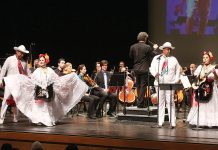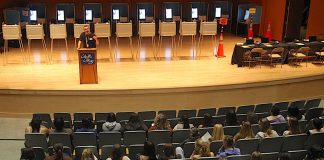Editor’s note: This article covers a handful of the more notable laws that take effect in 2019.
SACRAMENTO — Every day, the U.S. uses 500 million plastic drinking straws, according to the National Park Service. Assuming that straws average 10 inches in length, that’s roughly enough to circle the earth three times, according to back-of-the-napkin mathematics performed by the reporters at this newspaper.
In an attempt to take a bite out of that stupefying figure, California will start prohibiting restaurants from providing straws unless customers ask for them. That comes thanks to Assembly Bill 1884, authored by Ian Calderon, D-Whittier.
•••
Children’s meals
Happy meals get a little less happy — and perhaps a bit healthier — this year with Senate Bill 1192, which prohibits restaurants from offering soda, juice and other sugary drinks as the default options in their children’s meals.
While kids can still request the sugary drinks they crave, the go-to drinks will be water or milk.
•••
Net neutrality
Earlier in 2018, Republicans successfully killed a nationwide net neutrality bill, a shot that was a win for internet companies in an ongoing war of profit over public information.
California lawmakers fired their own salvo this year with Senate Bill 822, which prevents companies such as AT&T from slowing, blocking or increasing fees for websites that require higher-than-average bandwidth. San Francisco Democrat Scott Wiener authored the bill.
•••
Primary voting changes
Californians could have a bigger role in presidential primary years with Senate Bill 568 by Ricardo Lara, D-Bell Gardens. That law moves California’s 2020 primary to the first Tuesday in March.
•••
A pot of new laws
It will come as a surprise to precisely nobody that police have noticed an uptick in the arrests of people for driving under the influence of marijuana after voters in 2016 legalized the drug.
But when this happens, police do not consider it as distinct from alcohol-related offenses. This makes it difficult for interested parties to track the unintended effects of marijuana legalization.
That’s where Assembly Bill 2058, introduced by Assemblyman Ed Chau, D-Arcadia, comes in.
The bill makes driving under the influence of cannabis, or driving under the combined influence of cannabis and another drug, each a separate offense.
•••
Old convictions
The California Department of Justice will review old marijuana convictions to see if any are eligible to be removed thanks to Assembly Bill 1793, authored by Rob Bonta, D-Alameda.
•••
Smoke up!
While we’re on that subject, it’s worth taking a look at Assembly Bill 2020, which allows people to smoke pot during special events at festivals, nightclubs and other venues. Previous law only allowed such monkeyshines at county fairgrounds. Assemblyman Bill Quirk, D-Hayward, wrote that new law.
•••
Pets and pot
And if you thought pot was just for people, you should consider Assembly Bill 2215, by Ash Kalra, D-San Jose.
Under the law, pet owners can freely discuss with their veterinarians pet cannabis products, which have multiple medicinal benefits.
However, veterinarians cannot administer the products to animals or prescribe any cannabis products to animals.
•••
Battling offshore drilling
In an attempt to combat the Trump administration’s plans to expand offshore oil drilling, Assemblyman Al Muratsuchi, D-Torrance, and Senator Hannah-Beth Jackson, D-Santa Barbara, teamed up with Assembly Bill 1775 and Senate Bill 834. While the federal government controls the waters three miles offshore, the laws prohibit developing pipelines or other means of getting the oil to onshore production facilities.
•••
Doctor disclosure
Under Senate Bill 1448 by Jerry Hill, D-San Mateo, doctors must tell patients if they are on probation for violations such as gross negligence, substance abuse, inappropriate prescribing or sexual misconduct. This law takes effect in July.
•••
A new choice for lunch?
California could see an uptick in the numbers of sidewalk vendors under Senate Bill 946 by Senator Ricardo Lara, D-Bell Gardens.
The law prohibits local governments from banning sidewalk sales of food and other merchandise, and allows them to issue vendor licenses.
Violations of the local rules will not result in criminal charges.
•••
More food news
Under Assembly Bill 626, written by Assemblyman Eduardo Garcia, D-Coachella, culinary entrepreneurs can sell food they make in their kitchens to the public, provided they pass health and safety inspections.
•••
New gun laws
Under Assembly Bill 2103 by Todd Gloria, D-San Diego, anyone who wants a concealed weapons permit in California will now have one more requirement in this already onerous process.
Beginning in January, applicants will need to prove their proficiency in shooting and safe handling of their guns. The law also raises the minimum training period to eight hours.
Currently, anyone 18 or older can purchase a rifle or a shotgun. After Jan. 20, Senate Bill 1100 by Sen. Anthony Portantino, D-La Cañada Flintridge, raises that age minimum to 21.
•••
Sexual harassment training
Senate Bill 1343 by Holly Mitchell, D-Los Angeles, will require sexual harassment training for all workers at any business with at least five employees.
The law mandates at least an hour of instruction within six months of being hired, and every two years after that.
•••
Other new training
Under Assembly Bill 2504, police officers and dispatchers will receive a course on sexual orientation and gender identity through the California Commission on Peace Officer Standards and Training.
•••
Choose your gender
The LGBTQ community also got a boost with Senate Bill 179, by Toni Atkins, D-San Diego. That law allows people applying for a driver’s license to choose male, female or non-binary on their applications. Those who want to change the gender listed on their license can do so after Jan. 2.
•••
Voting by mail
Voting by mail gets easier this year with Assembly Bill 216 by Lorena Gonzalez-Fletcher, D-San Diego.
This new law requires elections offices to include an envelope with prepaid postage to anyone voting by mail. Local agencies can request reimbursement from the state.
•••
Helmet law relaxed, for grown-ups
In January, people who ride electric scooters can feel the liberation wind in their hair and the thrill of possible head trauma under Assembly Bill 2989, authored by Heath Flora, R-Ripon. The law removes the requirement to wear helmets.
But minors be advised: this does not apply to you.
Assembly Bill 3077 by Anna Caballero, D-Salinas, provides a citation for anyone under 18 caught riding a bicycle, skateboard, scooter or skates without a helmet. Violators can take a safety course and prove they own a helmet to avoid paying the fine.
•••
Bike riders must stop after crashes
Speaking of bicycles, anyone riding one who leaves the scene of an accident where they hit someone will face felony hit-and-run charges under AB 1755, which was written by Assemblyman Bill Dodd, D-Napa.
•••
Concerning minors
Palmdale Republican Assemblyman Tom Lackey authored a bill that removes the ability of judges to suspend driver’s licenses of minors who are considered habitually truant.
Life will also be easier for teens under 16 convicted of crimes, even serious ones, under Senate Bill 1391, authored by Ricardo Lara, D-Bell Gardens, and Holly Mitchell, D-Los Angeles. The law prohibits young people from being sent to adult prisons.
Assemblywoman Lorena Gonzalez Fletcher, D-San Diego, aimed to ease financial burdens for young people with Assembly Bill 1974, which prohibits schools from withholding diplomas to high school students with past-due fees for uniforms, overdue library books and bus fares.
•••
Reduced-price meals expand
Assembly Bill 1871 by Rob Bonta, D-Alameda, extends the reduced-price meals already mandated at public schools to charter schools.
•••
Prosecution fees
Local governments will no longer be able to charge for the cost of investigation, prosecution or appeals process of criminal cases thanks to Assembly Bill 2495.
•••
More choices for buying booze
Small distillers will be able to sell products such as vodka and whiskey directly to consumers, much like wineries do under Senate Bill 1164, by Senator Nancy Skinner, D-Berkeley. Current law requires customers to first take a tour to buy alcohol.
•••
Vegetarian options
Also by Skinner is a law that will give more dining options to people living in healthcare facilities and prisons.
Senate Bill 1138 requires providers in these places to offer more “plant-based” options.
•••
Lactation location accommodation
Employers must provide a private area for mothers to pump breast milk or to nurse under Assembly Bill 1976, by Assemblywoman Monique Limón, D-Goleta. This area cannot be a bathroom.
•••
Employment files
Employees who want a copy of their employment file need only ask, thanks to Richard Pan, D-Sacramento, who authored Senate Bill 1252.
•••
Women in power
“Old boys’ clubs” take a step closer to long-past-due extinction under Senate Bill 826, which requires publicly-traded companies to have at least one woman on their boards of directors by the end of 2019. That number rises to at least two by 2021.
Thank Senator Hannah-Beth Jackson, D-Santa Barbara, for that one.
•••
What about the pets?
A series of laws govern who gets custody of children in divorce proceedings. But what about Rover and Fluffy?
That confusion is a thing of the past under Assembly Bill 2274, by Assemblyman Bill Quirk, D-Hayward. That law allows a judge to decide who takes care or feeds the pets.
•••
Cleaning up your lift
Under Senate Bill 1014 by Nancy Skinner, D-Berkeley, online ride hailing services such as Lyft and Uber must meet higher emissions standards over the next few years. Those companies must also increase their numbers of zero-emissions vehicles.
•••
Increasing penalties for drunk drivers
In an attempt to reduce the numbers of people killed or injured by drunk drivers, Senator Jerry Hill, D-San Mateo, authored Senate Bill 1046. The law requires first-time and repeat DUI offenders to install an ignition interlock device, which are essentially breathalyzers on their vehicles.
First-time offenders are required to use the devices for six months, and that time period goes up for subsequent offenses.
Offenders must pay for the devices, estimated at $70-$120 for installation and $3 per day.
SB 1046 allows full driving access for those with the devices.
•••
HOV changes
About 215,000 people who own low-emission electric vehicles could be in for a shock starting Jan 1, when their green and white decals that allow them access onto the coveted HOV lanes will expire.
Only those with red or purple decals will have that privilege. Contact the DMV at www.dmv.ca.gov for details.
•••
A win for quiet
Owners cited for vehicles and motorcycles with loud, skull-rattling exhaust systems can no longer correct the problem instead of paying a fine. We can thank Assembly Bill 1824 for that.











